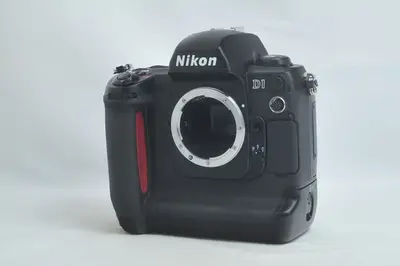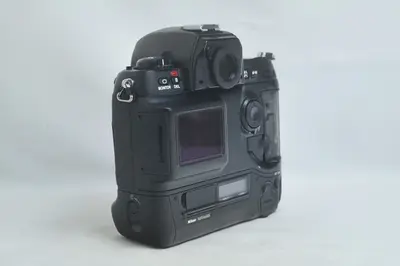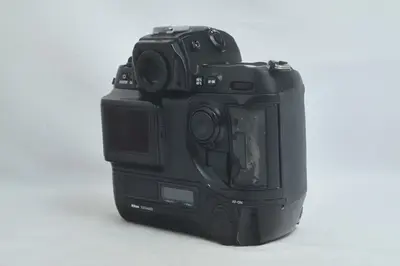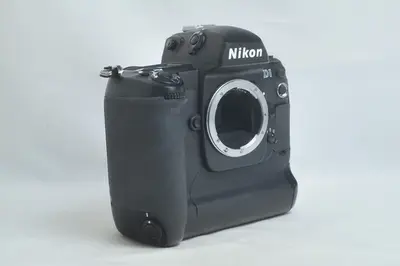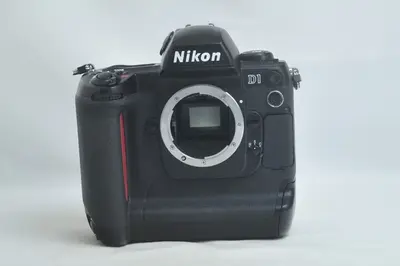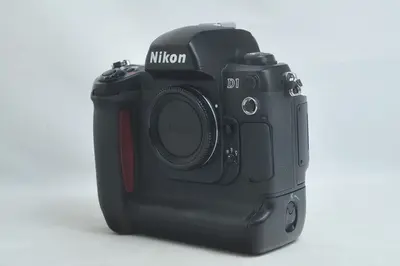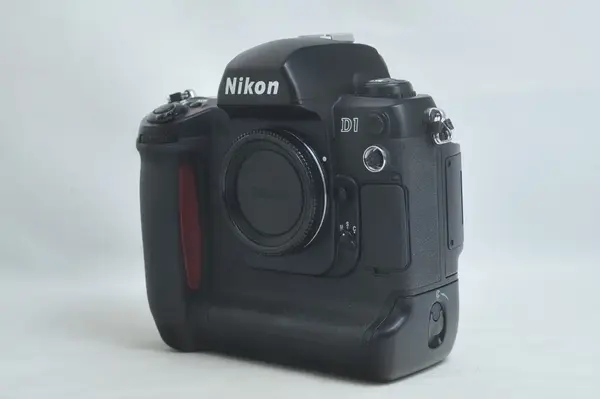
Nikon D1
| Brand | Nikon 2001 |
| Model | 5034605 |
| Released Year | 2001 |
| Type | Digital Cameras |
| Series | D |
| Color | Black |
| Autofocus | 5-point TTL phase detection |
| Status | Discontinued |
Quick view
Overview
The Nikon D1 was a groundbreaking professional digital single-lens reflex (DSLR) camera released in 2001. It featured a 2.7-megapixel CCD sensor measuring 23.7 x 15.6 mm. The D1 supported Nikon F-mount lenses, enabling compatibility with a broad range of Nikon's professional glass. It utilized a 3D multi-pattern metering system for accurate exposure control and had an ISO range of 200-1600, adjustable in steps. The camera's shutter speed ranged from 30 seconds to 1/16000 seconds, providing versatility for various photographic scenarios. Additionally, the D1 featured a 2.5-inch LCD monitor for image review and menu navigation.
Specifications
| Release Year | 2001 |
| Sensor Type | CCD |
| Effective Pixels | 2.7 megapixels |
| Sensor Size | 23.7 x 15.6 mm |
| Lens Mount | Nikon F-mount |
| ISO Sensitivity | 200-1600 |
| Shutter Speed Range | 30s to 1/16000s |
| Continuous Shooting Speed | 4.5 fps |
| Viewfinder | Optical pentaprism |
| LCD Screen | 2.5 inch |
| Storage Media | CompactFlash (CF) card |
| Battery | EN-4 NiMH rechargeable battery pack |
| Weight | Approx. 1,180 grams (body only) |
| Dimensions | 156 x 117 x 83 mm |
| Metering | 3D multi-pattern TTL metering |
| Autofocus | 5-point TTL phase detection |
| White Balance | Auto, preset modes, manual adjustment |
| Screen Size | 2 in |
| Color | Black |
| MPN | 5034605 |
| Battery Type | Lithium-Ion |
| Series | Nikon D |
| Type | Digital SLR |
| Manufacturer Warranty | 1 Month |
| Maximum Resolution | 2.6 MP |
| Model | Nikon D1 |
| Connectivity | USB |
| Charger Included | No |
| Country/Region of Manufacture | Japan |
| Item Weight | 38.4 Oz. |
Images
Key Advantages
The Nikon D1 was one of the first affordable professional DSLRs, reducing the price barrier for digital photography. It offered excellent image quality for its time with high ISO sensitivity up to 1600, suitable for various lighting conditions. The camera's robust build quality and weather-sealed construction made it reliable for professional use. It utilized CF cards for storage, enabling quick data transfers. The fast continuous shooting speed of up to 4.5 frames per second allowed capturing action shots effectively. Integration with Nikon F-mount lenses provided flexibility and access to a wide lens selection.
Limitations
The 2.7-megapixel resolution became quickly outdated as higher-megapixel cameras emerged. The digital noise at higher ISO settings was apparent compared to modern standards. The rear LCD was relatively small with limited resolution and did not support live view functionality. Battery life was modest given the power demands of early digital components. Autofocus performance, though competitive at the time, was slower and less accurate than current models. The camera lacked advanced features like video recording or extensive customization options.
FAQ
What type of sensor does the Nikon D1 use?
The Nikon D1 uses a 2.7-megapixel CCD sensor measuring 23.7 x 15.6 mm.
Is the Nikon D1 compatible with modern Nikon lenses?
The Nikon D1 is compatible with Nikon F-mount lenses, which includes many lenses still available today, though some advanced lens features may not be fully supported.
What ISO range does the Nikon D1 support?
The Nikon D1 supports an ISO range from 200 to 1600.
Does the Nikon D1 have video recording capabilities?
No, the Nikon D1 does not support video recording as it was designed primarily for still photography.
What type of storage media does the Nikon D1 use?
The Nikon D1 uses CompactFlash (CF) cards for storage.
What is the continuous shooting speed of the Nikon D1?
The Nikon D1 can shoot continuously at up to 4.5 frames per second.
Does the Nikon D1 have an LCD screen for image review?
Yes, it has a 2.5-inch LCD screen primarily for reviewing images and navigating menus.
Disclaimer
The content on is provided for general informational purposes only. We do not guarantee the accuracy, completeness, or reliability of any information, specifications, or visuals presented on the site.
is not responsible for any content, images, or data uploaded or shared by users. Users are solely responsible for the content they submit.
We may include links to third-party websites for convenience. We do not endorse or take responsibility for the content or policies of any external sites.
Use of the site is at your own risk. Always verify critical information independently before making decisions based on content from this website.

